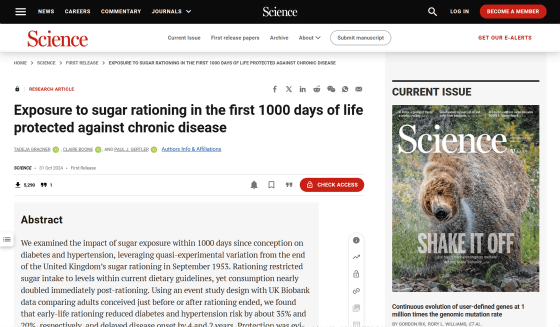Children who consumed less sugar early in life were found to have a significantly lower risk of type 2 diabetes as adults

Too much sugar is known to be
Exposure to sugar rationing in the first 1000 days of life protected against chronic disease | Science
https://www.science.org/doi/10.1126/science.adn5421

Sugar restrictions in utero and early childhood reduce risk of chronic disease, study finds | Haas News | Berkeley Haas
https://newsroom.haas.berkeley.edu/research/exposure-to-sugar-restrictions-in-utero-and-early-childhood-reduces-risk-of-chronic-disease-study-finds/
Diabetes risk soars for adults who had a sweet tooth as kids
https://www.nature.com/articles/d41586-024-03535-7
Low Sugar in Baby's First 1,000 Days Reduces Chronic Disease Risk, Wartime Study Finds : ScienceAlert
https://www.sciencealert.com/low-sugar-in-babys-first-1000-days-reduces-chronic-disease-risk-wartime-study-finds
Although excessive sugar intake is known to have adverse effects on people's health, it is difficult to actually measure the amount of sugar people consumed during childhood and to know their health condition later in life. Therefore, a research team from the United States and Canada conducted a study on people in the UK, where sugar was rationed from World War II until 1953.
In the UK, economic difficulties during World War II forced the government to introduce food rationing. Rationing of some foods, such as meat and sugar, continued for some time after the war, with sugar rationing limited to less than 40g per day for adults and 0g for children under two. Of course, it is highly likely that parents shared some of the sugar they received with their children, but children's sugar intake was likely significantly less than when sugar was freely available.
After rationing ended, sugar consumption in the UK soared, reaching an average of about 80g per day. This dramatic change in environment allowed the research team to compare 'people who had little access to sugar in their childhood because of sugar rationing' with 'people who had relatively free access to sugar from an early age.'

The research team extracted data from
The analysis showed that children who were rationed for approximately 1,000 days from conception through the first two years of life had an average 35% lower risk of developing type 2 diabetes as adults and an approximately 20% lower risk of developing high blood pressure.
Even if sugar rationing was lifted while babies were still in their mothers' wombs and sugar was freely available after birth, the risk of developing chronic diseases in adulthood was reduced. Even if people developed type 2 diabetes or high blood pressure in adulthood, those whose sugar intake was restricted from fetal to early childhood tended to develop type 2 diabetes about four years later and high blood pressure about two years later.
Lead author Tadeja Gracner, an economist at the University of Southern California, was inspired to do this study after reading about the derationing of sugar in the UK. 'Studying the long-term effects of sugar intake on health is difficult because it's hard to find situations where people are exposed to random, different nutritional environments early in life and then followed for 50 to 60 years,' Gracner said. 'The derationing of sugar provided a new natural experiment that overcomes these problems.'

Gracner pointed out that the results of this study do not necessarily mean that pregnant women and infants should not consume any sugar at all. However, he argued that modern people tend to consume too much sugar, so it may be necessary to make an effort to reduce the amount of sugar to some extent.
Related Posts:







